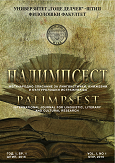APPLICATION OF STANDARDS-BASED ASSESSMENT FOR CRITICAL THINKING SKILLS DURING LANGUAGE ACQUISITION
DOI:
https://doi.org/10.46763/PALIM24918185zaAbstract
Critical thinking, a fundamental cognitive process, is recognized as pivotal across various domains of human endeavor. Employers prioritize this competency due to its indispensable role in comprehending challenges, exploring opportunities, and making informed decisions within contemporary competitive environments. Consequently, this study employs a mixed-methods approach, combining qualitative and quantitative methodologies to underscore the necessity of integrating standards-based assessment methodologies to evaluate critical thinking skills within language acquisition. Emphasizing this imperative during curriculum design and implementation is crucial, necessitating delineating effective strategies to incentivize students to enhance these proficiencies. As seasoned educators, we recognize the profound significance and applicability of critical thinking across disciplines, hence integrating activities to foster diverse facets of critical thinking within our instructional frameworks. This paper presents the outcomes of analyzing standards-based assessments about critical thinking skills in the domain of the Macedonian language for professional purposes during the academic year 2022/2023 at the South East European University in the Republic of Macedonia. Mastery of these skills is imperative for students to grasp the conceptual underpinnings of their academic pursuits, thereby equipping them for their forthcoming professional endeavors. However, educators consistently grapple with students' deficiencies in these competencies, with fostering critical thinking emerging as a primary pedagogical challenge. Our research findings affirm a significant correlation that is heightened awareness among students regarding the significance of critical thinking correlates positively with increased dedication toward solving pertinent tasks conducive to advancing these cognitive abilities.
Keywords: critical thinking skills; standards-based assessment; language acquisition; Macedonian language.
Downloads
Downloads
Published
Issue
Section
License
The intellectual property and copyright on the original content of all scientific contributions in the published paper shall remain with the authors. Authors give permission to the PALIMPSEST owner to publish the paper. All authors agree to publish the paper under Attribution-NonCommercial-NoDerivatives 4.0 International license (CC BY-NC-ND 4.0)


